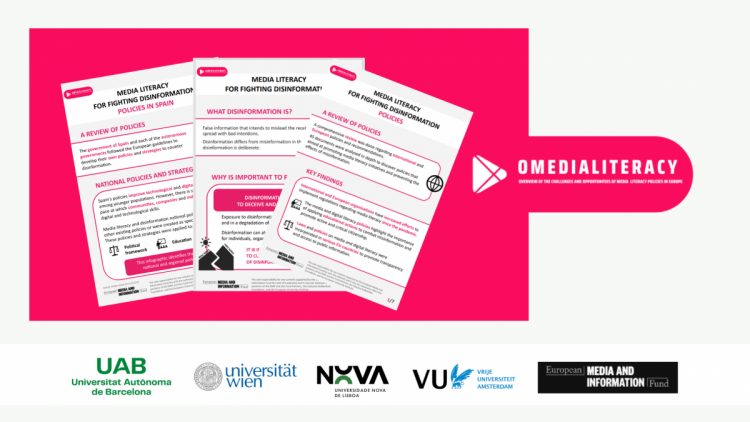The project “Omedialiteracy: Overview of the challenges and opportunities of media literacy in Europe” publishes a collection of fifteen infographics summarising the main results of the initiative.
The work has been developed by the research team of the Universidade NOVA de Lisboa, based on a systematic review of European literature, policies and initiatives in the field of media literacy and the fight against disinformation in the European Union and, more specifically, in Spain, Portugal, the Netherlands and Austria. The documents aim to break down the findings of these first three reports and make them more accessible to the general public and to the main target groups defined in the project’s communication plan: educators, journalists and policy makers.
The infographics are now available free of charge on the official Omedialiteracy website. The project, which ended on 29 February 2024, is now in the final phase of justification and is awaiting renewal for a second part, which will focus on communicating and disseminating the results obtained during the first phase of the research.
Omedialiteracy is an initiative funded by the European Media and Information Fund (EMIF) and led by the Gabinete de Comunicación y Educación of the Universitat Autònoma de Barcelona (UAB), together with the Universidade NOVA de Lisboa, the University of Vienna and the Vrije Universiteit of Amsterdam, whose main objective has been to analyse state of the art in media literacy and the fight against disinformation in the countries of the respective agents involved: Spain, Portugal, Austria and the Netherlands.
The Gabinete de Comunicación y de Educación is a consolidated group specialised in scientific research and dissemination, which belongs to the Department of Journalism and Communication Sciences of the UAB. Recognised by AGAUR (Agència de Gestió d’Ajuts Universitaris i de Recerca) of the Generalitat de Catalunya as a Consolidated Research Group on the basis of its trajectory, projection and development, it develops projects and research in the field of convergence between communication and education. Since its creation, it has developed initiatives aimed at integrating, with awareness and freedom, communication technologies in the so-called global or knowledge society.
Under the direction of Santiago Tejedor, the Gabinete organises several of its own Master’s Degrees, such as the Master’s Degree in Travel Journalism (on-site and online), the Master’s Degree in Communication and Education, the Master’s Degree in Environmental Communication and the Master’s Degree in Political and Electoral Communication Management. The group has a wide and varied collection of publications, in the form of scientific articles, books and book chapters, and other works, which is constantly being renewed. It also has a laboratory for teaching innovation projects, transfer and new formats that are conceived and developed from a perspective based on creativity and multidisciplinary work. Every year, the Gabinete organises an academic expedition that travels around the world with students from different universities and careers. This is the Tahina-Can Expedition, which has been awarded as the best educational project in Spain. It also has the portal Tu Aventura, the educational platform InfoEDU and the newsgames and science project Reporter@s de la Ciencia.

